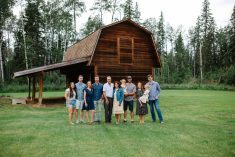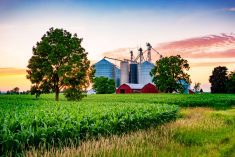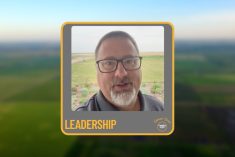The reasons farms diversify are as varied as the types of farms. The options are equally numerous. Maybe it’s to enhance or grow the operation or to add more income streams. Or the owners come across an opportunity too good to turn down. So, how does someone decide when to diversify and what option to choose?
Diversifying the farm operation involves managing change and learning lessons through a process that will inform subsequent rounds of change.
Their next change
Read Also

How scientists are using DNA and climate data to breed crops of the future
A method for forecasting how crops will perform in different environments so that plant breeders can quickly select the best parents for new, climate-resilient varieties.
Grant Dyck and wife Colleen, who built Artel Farms near Niverville, Man., have diversified many times over the past 23 years.
“We were in livestock when my dad was around. We had joint ventures with other farms, custom farming, ran an elevator,” says Dyck. “The goal of every discussion was to have the farm as the base of anything we do, and everything we did on the side was to help grow the farm or make it better.”
From a young age Dyck dabbled in lucrative sidelines such as commercial scrap metal and commercial demolition, so when a friend suggested they begin a wood manufacturing business (Wood Anchor) recycling felled elm trees from the City of Winnipeg into furniture and flooring, he didn’t hesitate. And when a local abandoned elevator came up for sale, he purchased it and successfully transloaded rail cars for a while.
At one point Colleen developed an energy bar that led to a side business, Gorp, being born. The couple started out manufacturing them in their home’s basement, but eventually converted an old shop into a production facility as demand and contracts grew.
In 2015, another friend of Dyck’s developed a prototype for a ditcher and after a few design tweaks, Dyck and his friend started T-Rex Ditchers. They generated interest at some farm shows and began building the ditchers on-farm, bringing in another partner later on to fabricate them off-site.
Knowing when change must change
Good change management is about recognizing when the change itself has to change. For the Dycks that meant backing away from Wood Anchor when the time was right, closing the elevator when issues around rural/urban land zoning cropped up, and making the decision to sell Gorp last winter. They are also currently seeking a buyer for T-Rex.
It’s not that these ventures haven’t been successful. In fact, it’s the success of the enterprise that prompted Dyck to move on.
“I could sell 40 T-Rex today but to scale up, we need a lot of resources just to do an inventory build,” he says. “People don’t pre-order, they want it ‘yesterday’ and our components come from Europe. There’s enough demand for this that someone big needs to take it and run with it.”
Since Dyck’s sister, Rachel, a CPA-CA, came back to the farm as its CFO (chief financial officer) three years ago, the focus has turned to fine-tuning the farm operation itself. That includes a deep dive into actual costs for all aspects of production and operations and understanding that everything must be based on sound economics.
“In our high-volume, low-margin industry, we’re getting into some niche areas but it has to come down to economics,” Dyck says. “We tore the place apart looking at it from a managing, accounting and strategic planning standpoint to see where our best profit centres are. On everything we do, we asked ourselves: what is the most consistent rates of return? How do we focus our capital, skills and time to get the best return?”
As a result, the farm is now more focused on selling what it produces direct to customers, such as oil processors, local feed mills and food companies. They’re also focused on increasing the capacity of enterprises that add value to the farm, but which provide synergistic opportunities with other growers and industries in the area as well, such as the inland grain terminal Dyck built on the farm in 2015.
Lessons learned
Dyck says that building inland was a win-win. “We overbuilt a dryer with the intention of providing a service not just for our farm but for the area. We dry around 7,000 acres of corn for farmers locally and it was a good solution for the need. There are good synergies with the local feed market as there is a large hog industry here and many growers have increased their corn production because they have this tool available. We are doubling capacity this year and there are also brokerage opportunities, but it’s still our wheelhouse, our industry.”
Dyck’s advice for managing change is know your risk and stress tolerance and what your priorities are.
“I am definitely becoming more realistic with time,” Dyck says. “Back in the early days we were highly leveraged and when you feel you have nothing to lose, your risk tolerance is higher because there is some blind optimism. Today, I have learned that critical decisions require comprehensive information instead of gut-type marketing and speculating.”
Over the years, Dyck also learned not to jeopardize the core farm business by stretching resources — whether it’s money, time or people — too thin.
“We’ve bet the farm a couple of times on a few ideas and decided that’s the one thing we’re not going to allow ourselves to do,” he says. “There is a ceiling, a limit to the management ability and the time that someone has.”
Going vertical
When Dan and Fran DeRuyck decided to transition their grain farm near Treherne, Man., to organic in 2004, the Canadian market for organic grains was still developing. They had to get creative to add more value to the operation.
Dan’s dad, Gerry, had gone organic on his farm a few years earlier after securing a contract to supply the Tall Grass Prairie Bakery in Winnipeg, which took all his production.

Dan and Fran took over management of both farms around 2010. The operation had grown from Gerry’s original 40 acres to around 650 acres of organic grains like wheat, spelt, flax and oats. At this point, they knew they needed to expand their product lines and markets with more value-added products.
Gerry had already purchased and set up a small flour mill at the home farm and was selling flour direct to local customers, who were key to helping the DeRuycks decide where and how they needed to diversify.
“Dad was approached by some people about making flour because there weren’t many flour mills doing organic flour at that time,” Dan says. “Customer need keeps driving us to try different things. We’ve expanded our product lines over the years based on what our customers tell us they want.”
Soon after taking over the grain processing, Dan and Fran upgraded and expanded the mill.
“We bought a new mill and roller that was faster and could do things easier and better,” Fran says. “We got everything set up, inspected and jumped through the hoops needed to get everything running properly.”
The DeRuycks now offer bagged oats and oat, wheat, rye, spelt and buckwheat flour as well as buckwheat and rye berries and millet. They also offer grain cleaning, custom milling and bagging services for other organic farmers. They do their own monthly product deliveries to various retail stores, bakeries and buying groups across southern Manitoba.
Adding value
The DeRuycks have been careful to diversify into things that complement the farm, the crops they grow and their capabilities. The next logical step for their farm’s diversification strategy is to add cold-pressed sunflower oil to their product lineup.
“We grow and clean sunflowers, and had the chance to buy some pressing equipment and existing market from someone who is retiring,” Dan says. “Sunflowers work well in our rotation and give us another avenue to add value to our organic sunflowers and serve another market.”
The organic market has expanded considerably and a lot of large food companies are getting into the organic sector. Athough the DeRuycks have grown their customer base over the years they aren’t actively looking to grow to that scale, especially as their adult children are pursuing other careers and aren’t interested in taking over the farm.
“Many of our customers have been with us for over 20 years,” Dan says. “So, we’ve had a good base to work with. We do pick up a few new customers here and there but for the most part it’s enough for Fran and I to maintain at this point.”
For now, the DeRuycks are focused on adding value to the farm in other ways by trying to figure out how to do no-till organic farming and adding ancient grains like Emmer and Einkorn to their rotation.
Work your way up to change
What advice do the DeRuycks have for farmers interested in adding value to their farm production?
“Start slow because if you develop a market but have no product to supply, your customers will get frustrated and it’s hard to get them back at that point,” Dan says. “It takes money to get into processing or to build inventory, so start on a smaller scale and work your way up. There is a learning curve. If you want to make a mistake you don’t want to make a huge one, you want to minimize your loss as much as you can.”
While Fran does a great job of keeping the accounting records for the farm as a whole, Dan admits he has sometimes found it hard to separate out individual processes.
“I would advise someone starting a value-added venture to keep track of costs as your product moves through the system,” Dan says. “It’s helpful to find areas for improvements in efficiency.”
Greek philosopher Heraclitus said “you cannot step twice into the same stream.” Everything is in a constant state of movement. So, if change is inevitable, its effect on people’s lives and businesses depends largely on how they manage it; whether they embrace and build on it or fear and hide from it.
Fran and Dan choose to embrace it with gusto, Dan says, “You will make mistakes but remember to enjoy what you are doing.”
– This article was originally published in the March 2024 issue of Country Guide.
















